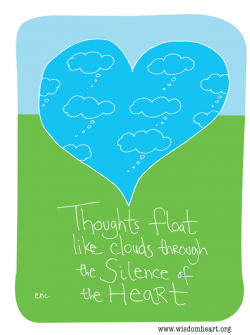What happens when we find it hard to stop our mind from wandering?
I received the following comment from a reader:
“I am just starting with the practice of meditation. As a very controlled and controlling individual (trying not to be), I am finding it very hard to stop my mind from wandering around.”
That’s good news! Why?
It means the practice is working!
When this happens, it means that we are seeing the wild, wandering nature of the mind and sensing the futility of trying to control thought. We are not failing, we’re seeing that thought doesn’t come to rest via strategies of control.
Trying to control thought is like trying to lasso the wind.
So, when thoughts are blowing around, you’re not doing something wrong. Meditative stillness doesn’t come through controlling your mind; just as peace doesn’t come through winning wars. Don’t waste your energy there.
The strategy of control sets up a never-ending conflict between you and your experience.
Whether that experience is of thoughts, people, or events, if you’re trying to control them, you’re caught in a never-ending war. The more you fight the flow of thought, the more thoughts proliferate.
The practice of meditation offers a different path.
A way of relating to all patterns—including the control pattern—with loving awareness.
Rather than being identified with the controlling impulse and its futile struggle to arm wrestle thought into submission, you see the impulse to control as one thought pattern among many.
This removes it from the driver’s seat.
It’s no longer directing the focus of your attention. Of course, the controlling pattern is still there in the car—either riding shotgun or in the back seat—periodically shouting about how badly you’re meditating and that you should just squash unruly thoughts into stillness.
As you cultivate meditative awareness and loving awareness, you start to hear another wiser, truer voice.
Little by little,
as you left their voices behind,
the stars began to burn
through the sheets of clouds,
and there was a new voice
which you slowly
recognized as your own,
that kept you company
as you strode deeper and deeper
into the world. ~ Mary Oliver (The Journey)
That deeper voice which emerges is wisdom itself.
Not a thought. Not an idea about what’s right or wrong. An all pervading radiance that comes from the depths of your being.
Trying to control thoughts keeps you from opening to the depths of your being.
Trying to control your life keeps you from touching the depths of life. This hurts.
It hurts you and those you love.
This is what the meditative awareness reveals.
So, what to do about the controlling pattern?
Allow the controlling tendency to be. Don’t compound the issue by trying to control the controlling.
Let it be and infuse the pattern itself with loving awareness.
What does this mean?
- Be fully present to the way the control pattern arises
- Notice the thoughts it stirs up: the emotions that accompany the controlling pattern and the sensations that swirl through your body.
- Become a loving witness to the dynamics of the control pattern.
 Don’t seek to control the controlling. There’s no need to adjust, improve, or change it.
Don’t seek to control the controlling. There’s no need to adjust, improve, or change it.
This pattern, like all patterns, can move freely through awareness just as clouds move through the open sky.
This is easy to say, but sometimes not easy to hear. When we hear the teachings, not just with thought but with meditative awareness, we’re immediately released from identification with the controlling pattern.
We see the patterns of thought for what they are: patterns.
They have their place in the mandala of our lives, but they are not who we are. They’re more like clouds floating through the open sky.
We are not the clouds, the patterns of thought.
We are the sky, the open, boundary-less, and undefended Wisdom Heart in which all patterns rise and dissolve away. That’s the ever-present stillness.
So, when the tendency to control arises, no need to get upset.
No need to interpret this as a sign of meditative failure. Hey, you’re noting the arising.
Now, just breathe.
Love elephant and want to go steady?
Sign up for our (curated) daily and weekly newsletters!
Editor: Renée Picard
Images: Eric Klein











Read 1 comment and reply